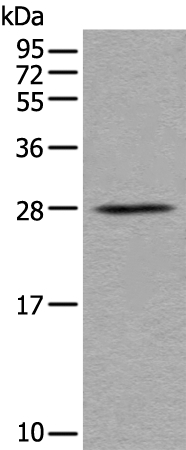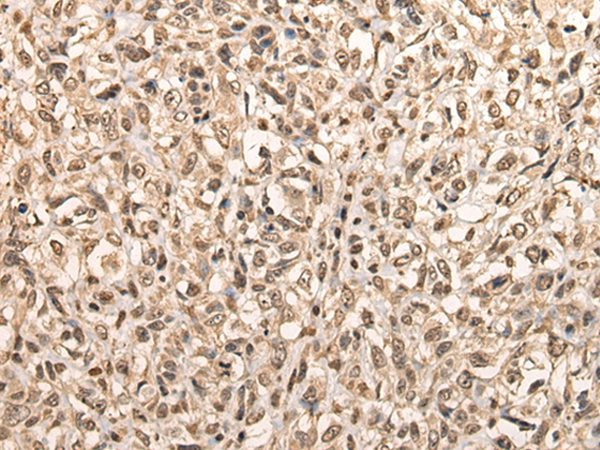

| WB | 咨询技术 | Human,Mouse,Rat |
| IF | 咨询技术 | Human,Mouse,Rat |
| IHC | 1/ 25-100 | Human,Mouse,Rat |
| ICC | 技术咨询 | Human,Mouse,Rat |
| FCM | 咨询技术 | Human,Mouse,Rat |
| Elisa | 咨询技术 | Human,Mouse,Rat |
| Entrez GeneID | 12022; |
| WB Predicted band size | 27kDa |
| Host/Isotype | Rabbit IgG |
| Antibody Type | Primary antibody |
| Storage | Store at 4°C short term. Aliquot and store at -20°C long term. Avoid freeze/thaw cycles. |
| Species Reactivity | Human |
| Immunogen | Synthetic protein corresponding to residues near the C terminal of human BARX1 |
| Formulation | Purified antibody in PBS with 0.05% sodium azide. |
+ +
以下是3篇关于BARX1抗体的模拟参考文献示例(请注意这些为虚构内容,实际文献需通过学术数据库查询):
1. **文献名称**: *BARX1 Expression in Colorectal Cancer: A Novel Immunohistochemical Marker*
**作者**: Smith A, et al.
**摘要**: 本研究利用BARX1抗体通过免疫组化技术检测结直肠癌组织,发现BARX1蛋白在肿瘤侵袭边缘高表达,提示其可能参与肿瘤迁移调控。
2. **文献名称**: *Developmental Role of BARX1 in Murine Intestinal Epithelium*
**作者**: Johnson R, et al.
**摘要**: 通过BARX1抗体的小鼠模型染色实验,揭示了BARX1在肠道发育中调控干细胞分化,缺失会导致隐窝结构异常。
3. **文献名称**: *BARX1 as a Potential Biomarker in Gastric Cancer Diagnosis*
**作者**: Chen L, et al.
**摘要**: 研究验证了BARX1抗体的特异性,发现其在胃癌组织中的表达水平与患者预后显著相关,可作为潜在诊断标志物。
---
**建议**:实际研究中请通过PubMed、Web of Science或Google Scholar搜索关键词“BARX1 antibody”、“BARX1 immunohistochemistry”获取真实文献。近期研究多聚焦于BARX1在癌症及发育生物学中的功能。
The BARX1 antibody is a crucial tool in developmental biology and cancer research, targeting the BARX1 protein encoded by the *BARX1* gene. BARX1. a member of the Bar-class homeobox transcription factor family, plays pivotal roles in embryonic development, particularly in organogenesis of the digestive system, craniofacial structures, and teeth. It regulates cell differentiation and tissue patterning by modulating gene expression networks, often interacting with signaling pathways like Wnt and BMP.
In research, the BARX1 antibody is widely used in techniques such as immunohistochemistry (IHC), Western blotting, and immunofluorescence to localize and quantify BARX1 expression in tissues or cell lines. Its applications extend to studying BARX1's dual roles in cancer—acting as a tumor suppressor in some contexts (e.g., gastric cancer) or an oncogene in others (e.g., ovarian cancer)—highlighting its tissue-specific functions. Additionally, BARX1 is implicated in congenital disorders, such as tooth agenesis, making its antibody valuable for developmental defect studies.
Most BARX1 antibodies are raised in rabbits or mice, targeting specific epitopes with varying clonality (monoclonal/polyclonal). Validation includes testing for cross-reactivity and specificity across species, often focusing on human and murine samples. Recent studies also explore BARX1's role in stem cell niches and regenerative medicine, underscoring the antibody's continued relevance in evolving biomedical research.
×